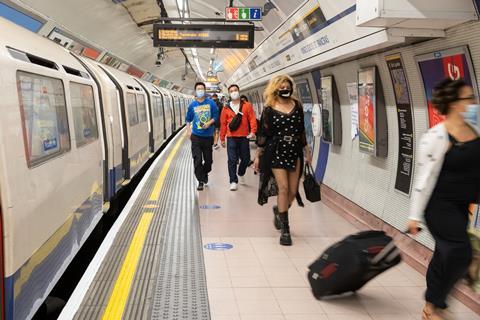
UK: The Department for Transport and Transport for London have agreed a Fourth Funding Package to replace revenue lost because of the drop in ridership during the coronavirus pandemic.
The latest package was announced on February 25, the day a short-term extension to the third package expired, and covers the period from February 26 to June 24.

There is an extraordinary support grant of £200m, to be paid in three instalments commencing on April 29. The government will also provide additional grants if revenue is lower than forecast, and TfL will pay any excess revenue to DfT.
This provides TfL with certainty that it will receive income equivalent to £1·615bn in passenger revenue over the period, in addition to the extraordinary support grant.
Under the deal TfL has committed to producing a plan by March 31 setting out options to achieve up to £400m of additional revenue or cost savings in 2022-23, in addition to previously agreed operating cost savings for the 2021-22 financial year. DfT has acknowledged that TfL is facing further cost pressures in 2022-23, and these proposals will be considered following a review of TfL’s 2022-23 budget.
The government has stated a willingness in the short and medium term to provide grant funding for renewals and enhancements, and will work towards an agreement for long-term capital support with an expectation that this agreement will be reached by March 31 2022.
Punch & Judy narrative
London’s Transport Commissioner, Andy Byford, said Mayor of London Sadiq Khan had already set out a range of proposals to help support TfL’s financial sustainability, and it is essential that agreement is reached on longer term capital support if ‘managed decline’ of the transport network is to be avoided.
Khan said ‘once again the government has just provided a short-term funding deal that will only enable TfL to continue running transport services for a few more months. This agreement makes reference to future capital investment for TfL, but it’s essential that this quickly turns into a concrete commitment’.
TSSA trade union General Secretary Manuel Cortes said the short term agreements mean TfL ‘can’t make plans and is in a position of stagnation and decline’.

Peter Hogg, UK Cities Director at Arcadis, said ‘it is a telling sign of how we’ve become so used to a Punch & Judy narrative and ultra-short bail-outs’ that DfT’s ‘plan for a plan’ running to the end of June ‘feels both quite strategic and refreshingly collaborative.’
He said ‘we should all be pleased to hear talk of commitment to a long term capital investment plan by the beginning of next financial year. Likewise, cost savings, increased revenue generation, accelerated transformation and pension sustainability are perfectly sensible and already in TfL’s plan. What is important now that both sides work collaboratively and in good faith to create a long term capital investment settlement that really sets London up with a strategic transport network that enables it to come out of the gates storming after the pandemic’.



